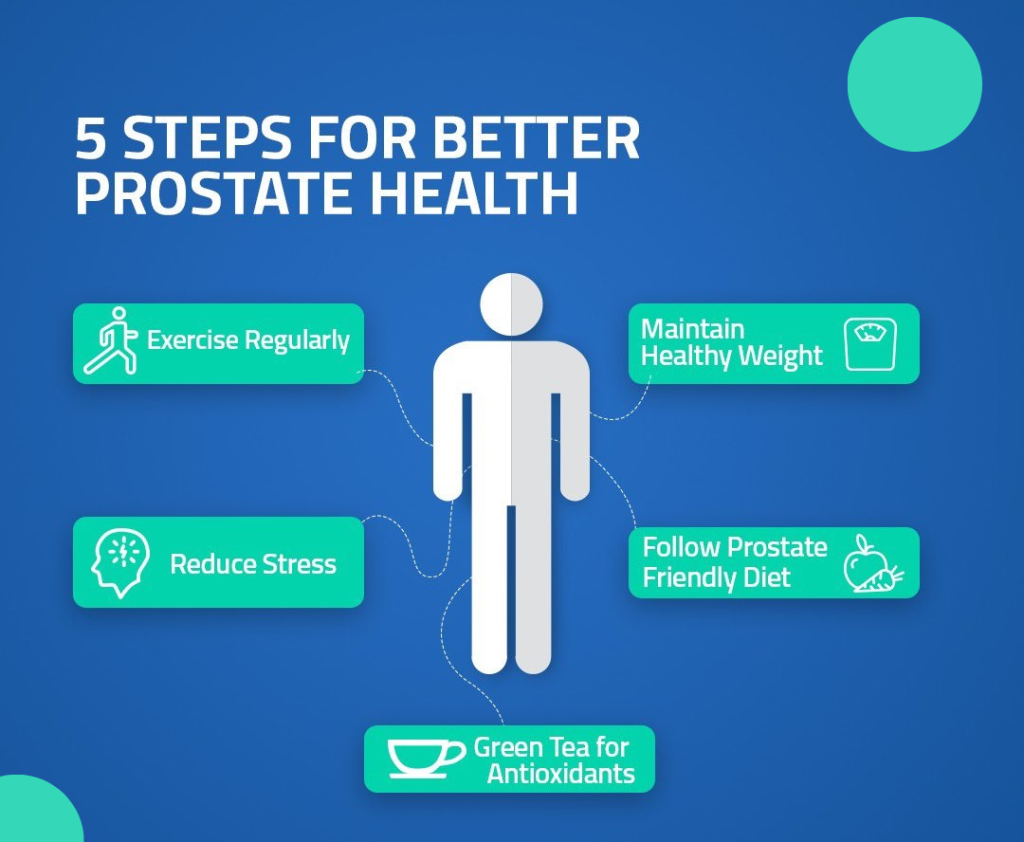Maintaining good prostate health is essential for men, especially as they age. A healthy lifestyle, balanced diet, regular check-ups, and staying informed about potential risks can help support prostate health and prevent common issues. Here are some practical tips to promote prostate health and overall well-being.

The most common prostatic diseases
Regular check-ups and early detection are key to managing these conditions effectively. The most common prostate diseases include:
- Benign Prostatic Hyperplasia (BPH): An enlargement of the prostate gland that is not cancerous, often causing urinary symptoms such as difficulty starting urination, weak urine flow, and frequent urination, especially at night.
- Prostatitis: Inflammation of the prostate, which can be either bacterial or non-bacterial. Symptoms include pelvic pain, difficulty urinating, and sometimes flu-like symptoms.
- Prostate Cancer: One of the most common cancers in men, prostate cancer often develops slowly and may not show symptoms in the early stages. Symptoms in advanced stages can include difficulty urinating, blood in the urine, and pelvic discomfort.
What should be taken into consideration for prostate health?
Maintaining good prostate health is important for overall well-being, especially as men age. Here are some tips to help support prostate health:
Diet and Nutrition
- Eat a Balanced Diet: Include plenty of fruits, vegetables, whole grains, and lean proteins in your diet. Foods rich in antioxidants, such as berries, nuts, and leafy greens, can be particularly beneficial.
- Healthy Fats: Focus on healthy fats from sources like fish, nuts, seeds, and olive oil. Avoid excessive intake of saturated and trans fats.
- Tomatoes and Lycopene: Tomatoes are high in lycopene, an antioxidant that may help lower the risk of prostate issues. Cooking tomatoes, such as in tomato sauce, can increase the availability of lycopene.
- Cruciferous Vegetables: Vegetables like broccoli, cauliflower, and Brussels sprouts contain compounds that may help protect the prostate.
- Green Tea: Drinking green tea may provide benefits due to its antioxidant and anti-inflammatory properties.
Lifestyle Choices
- Exercise Regularly: Engage in regular physical activity, such as walking, jogging, swimming, or cycling. Exercise helps maintain a healthy weight and can reduce the risk of prostate problems.
- Maintain a Healthy Weight: Obesity is linked to an increased risk of prostate problems. Aim for a healthy weight through diet and exercise.
- Limit Alcohol and Caffeine: Excessive alcohol and caffeine consumption can irritate the prostate. Moderation is key.
- Stay Hydrated: Drink plenty of water throughout the day to stay hydrated and support overall health.
Regular Check-Ups and Screening
- Regular Medical Check-Ups: Visit your healthcare provider for regular check-ups, including prostate exams. Early detection of prostate issues can lead to more effective treatment.
- Prostate-Specific Antigen (PSA) Test: Discuss with your doctor the appropriate time to start PSA testing, which can help detect prostate cancer early.
Healthy Habits
- Avoid Smoking: Smoking is linked to an increased risk of various cancers, including prostate cancer. Quitting smoking can significantly improve your overall health.
- Manage Stress: Chronic stress can negatively affect your health. Practice stress management techniques such as meditation, deep breathing exercises, yoga, or hobbies you enjoy.
- Sleep Well: Aim for 7-9 hours of quality sleep per night. Good sleep is essential for overall health and well-being.
Supplements and Natural Remedies
- Saw Palmetto: Some studies suggest that saw palmetto may help with symptoms of an enlarged prostate. Consult with your healthcare provider before starting any supplements.
- Zinc: Zinc is important for prostate health, but excessive intake can be harmful. Ensure you’re getting a balanced amount through your diet or supplements.
- Omega-3 Fatty Acids: Omega-3s, found in fish oil and flaxseed oil, may have anti-inflammatory effects that benefit the prostate.
- L-arginine containing supplements: Food supplements such as L arginine, cigrulline, pycnogenol, taurine etc. may be beneficial for prostate health. These products have antioxidant and muscle relaxant properties.
Avoid Harmful Substances
- Limit Red and Processed Meats: High consumption of red and processed meats has been linked to an increased risk of prostate cancer.
- Reduce Dairy Intake: Some studies suggest that high dairy consumption may be linked to an increased risk of prostate cancer. Moderation is advisable.
Sexual Health
- Regular Sexual Activity: Some studies suggest that regular ejaculation may reduce the risk of prostate cancer. Maintain a healthy and active sex life if it’s comfortable and safe for you.
Monitor Symptoms
- Be Aware of Changes: Pay attention to urinary symptoms such as frequent urination, difficulty starting or stopping urination, weak urine flow, or blood in the urine. Report any changes to your healthcare provider.
Incorporating these tips into your lifestyle can help support prostate health and reduce the risk of prostate problems. Always consult with your healthcare provider before making significant changes to your diet, exercise routine, or supplement regimen.
Summary
Supporting prostate health involves a balanced diet rich in fruits, vegetables, and healthy fats, regular exercise, maintaining a healthy weight, and limiting alcohol and caffeine. Regular medical check-ups and PSA tests are crucial for early detection of potential issues. Avoid smoking, manage stress, and get enough sleep. Consider beneficial supplements like saw palmetto and omega-3 fatty acids, L-arginine containing food supplements and monitor any changes in urinary symptoms, consulting a urologist as needed.
Prof. Dr. Emin ÖZBEK
Urologist
Istanbul- TURKIYE



Leave a Reply